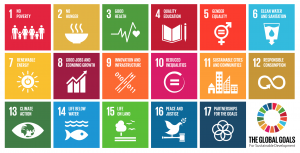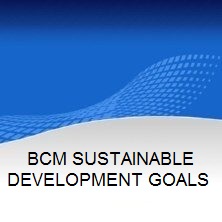
| BCM Sustainable Development Goal
The Sustainable Development Goals represent a universal blend of goals aimed at contributing to the efforts to achieve a more sustainable environment in every corner around the world. They emerged as a result of the Rio + 20 Conference and the need to adopt a universal framework that will extend in Millennium Development Goals – MDGs which expire at the end of this year, in order to establish a development agenda at national, regional and international level for 15 years. The objectives of sustainable development adopted in September 2015. by Member States of the UN The UN summit in New York, and began to be implemented in January 2016. Proposals for sustainable development objectives were developed by the Open-ended Working Group with representatives from over 70 countries, and the final draft of the 17 goals of sustainable development were published in July 2014 and were presented to the UN General Assembly in September of that year. The proposals were set based on the largest consultations ever conducted in the history and over 11 thematic consultations 83 national consultations and research done through the platform My World. It is important to look at the whole as more than just a universal set of goals to be achieved over the next 15 years. They could be perceived as an incentive to stimulate the dialogue, partnership and joint activities of citizens, groups, movements, organizations and institutions that work on different goals to achieve shaping of space, initiative and change that will positively affect the development of citizens, communities and cities. BCM stresses commitment to strengthen international cooperation in order to tackle persistent challenges related to sustainable development to all, especially in the developing countries. In that regard, it re-emphasizes the need to achieve economic stability, sustained economic development, the promotion of social equity and environmental protection, strengthening both gender equality, empowerment of women and equal employment opportunities for all and protection, survival and the full potential in the development of children, including through education. Each country bears primary responsibility for its own economic and social development and in this regard can not, and do not emphasize the role of policies implemented at national level as well as domestic resources and development strategies. Developing countries need additional resources for sustainable development. Also, there is a significant need of resources coming from various sources, but also efficient use of funds. BCM welcomes the commitment of industrialized countries for greater responsibility, but warns against too much optimism. The question is what obligations will the States, especially the extent to which all countries would accept to fulfill their obligations under UN control. Implementation of the objectives of sustainable development will depend on establishing a global partnership for sustainable development which will be actively involved as governments and civil society organizations, the private sector and the United Nations.These goals are integrally formed one and are an indivisible package of world priorities for achieving sustainable development. Individual tasks within individual frames are defined as such constitute preferences to achieve certain objectives at the global level, with individual governments of all countries should set their own national tasks to be developed and will be guided by worldly aspirations for their fulfillment. BCM recognizes the fact that people are the ones who are the focus of sustainable development and, in this context, aims at building in a righteous, equitable and inclusive world and is committed to work together with all stakeholders in the promotion of sustained and inclusive economic growth, social development and environmental protection and thus create benefits will be felt by all who live in it.
|

